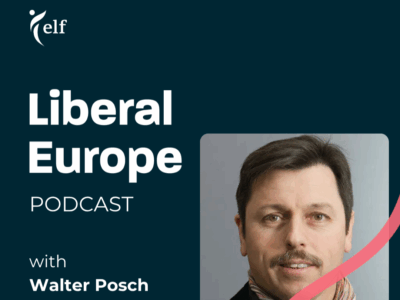The June issue of the 4liberty.eu Newsletter provides an overview of the articles published on the 4liberty.eu website, serving as a starting point for further exploration.
Martin Vlachynsky (INESS): Elastic EU Funds
Slovakia’s response to the tariff threat? The Prime Minister and the Minister of Economy have begun saying they want to redirect EU funds to help companies affected by US tariffs. We do not yet know exactly what this crisis will look like—but we already know the solution: European money…
Mate Hajba (Free Market Foundation): High-Speed Rail to Riches Is Achievable in Central and Eastern Europe Through Privatization
There is a great transportation divide between Western and Eastern Europe. The latter is slow to catch up to wealthier countries’ growing high-speed train network, hindering cohesion efforts.
IME: Bulgaria: Imbalance Between Doctors and Nurses in Hospitals Puts at Risk Quality of Healthcare Services
The declining number of nurses in Bulgaria over recent decades puts hospital healthcare services at risk. There is an unwritten rule that every doctor should have between two and three nurses to support their work effectively.
Rafaella Esparza Tello (Institute for Liberal Studies): Beyond Loving: How One Case Shaped – and Now Mirrors – Fight for Modern Freedoms
On June 12, 1967, Chief Justice Earl Warren famously declared “Under our Constitution, the freedom to marry, or not marry, a person of another race resides with the individual, and cannot be infringed by the State,” a pivotal statement that, 58 years ago today, forever changed American lives. The Supreme Court case of Loving v. Virginia sought to challenge the Racial Integrity Act of 1924, a law that legalized segregation and the mistreatment of African Americans, and specifically in the case of Mildred and Richard Loving, legalized the ability to discredit their marriage.
Blazej Lenkowski (Liberte): America Is Still Here
Nowadays, Polish Democrats must learn how to navigate the increasingly complicated reality of geopolitics and juggle competing priorities. In this context, however, the United States of America should be kept as a crucial associate as long as possible. The global balance of power and a realistic assessment of future trends make this strategy essential for Polish democracy.
Levente Csoka (Republikon Institute): Emergence of TISZA Party: Has Two-Bloc System Returned to Hungary?
In February 2024, Hungarian public life, previously marked by apathy, underwent a dramatic shift. A political scandal that reached the highest levels of government awakened Hungarian society. This rapid change reshaped Hungary’s political landscape within a few months and significantly shifted voter preferences. The party system was not spared from this rapid transformation either, and it can be clearly illustrated through Sartori’s party typology.
Stanislav Yukhymenko (The Institute for Economic Research and Policy Consulting – Kyiv): AI Regulation: Comparative Analysis of EU, USA, and Ukraine’s Approaches
The rapid development of artificial intelligence technologies creates both unprecedented opportunities for progress and significant risks to fundamental human rights, security, and privacy. This necessitates the development of balanced regulatory frameworks that would ensure the safe use of AI.
Sigita Silingaite (LFMI): Learning to Be: Does School Dare to Ask Why?
Children, parents, and teachers alike are increasingly questioning the school system. Ongoing reforms are gradually changing its face, yet often only superficially. The pupils suffer the most. Too much attention is paid to “what?” and too little to “why?”. The lack of meaning compounds their fear of not knowing.
European Liberal Forum & Liberte: Insights on the Iranian Regime and Society with Walter Posch [PODCAST]
What are the main Iranian actors and their options in the conflict with Israel? Are negotiations possible? What is the legitimacy of the regime and the potential for change from within the Iranian society? And can Eastern Europe serve as an inspiration for the Iranian reformists? Leszek Jazdzewski (Fundacja Liberte!) talks with Dr. Walter Posch, a trained orientalist who works as a Middle East expert at the Institute for Peacekeeping and Conflict Management at the National Defense Academy in Vienna.



![Learning to Be: Does School Dare to Ask Why? [4liberty.eu Newsletter] Learning to Be: Does School Dare to Ask Why? [4liberty.eu Newsletter]](https://4liberty.eu/phidroav/2025/02/newsletterfin-1024x1024.png)








